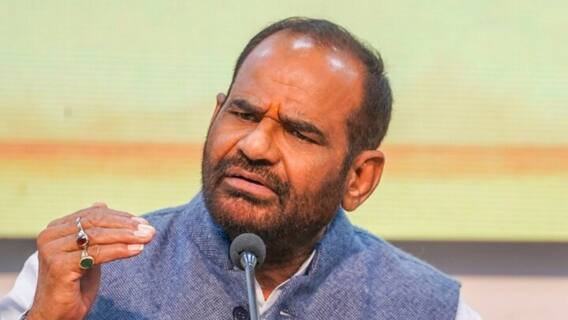Men's Mental Morbidity Is Over 6% Higher Than That In Women, Three Out Of Four Suicides Are In Males, Experts Say
Men are often taught not to openly express their emotions because it is considered "a sign of weakness" by many. About 40 per cent of Indian men do not talk about mental issues freely, experts say.

Men's Mental Health Awareness Month: Men and women suffer from mental health problems alike, but the issues faced by males are often overlooked due to certain stereotypes set by society. Men are often taught not to openly express their emotions and feelings because it is considered "a sign of weakness" by many. About 40 per cent of Indian men do not talk about their mental health openly, experts say.
Men suffer from different mental health problems including depressive disorders, bipolar disorder, anxiety disorder, schizophrenia, attention deficit hyperactivity disorder, conduct disorder, and developmental disorders, among others. There is a higher prevalence of substance use disorders in men, compared to women, due to a significantly higher consumption of drugs like opioids, cocaine, cannabis, new psychoactive substances, ecstasy-like substances, amphetamines, sedatives and tranquilizers by men.
Since June is men's mental health awareness month, ABP Live spoke to Dr Meenakshi Jain, Senior Consultant Psychiatrist, Amrita Hospital, Faridabad; Dr Shradha Malik, Founder-CEO, Athena Behavioral Health, Gurgaon; and Dr Sameer Malhotra, Director and Head, Department of Mental Health and Behavioural Sciences, Max Super Speciality Hospital, Saket, and asked them about the prevalence of different mental health disorders in men.
According to Dr Malhotra, men often find it difficult to deal with all work-related and family pressures, and do not feel free to discuss their problems with others, which leads to self-neglect and sometimes, substance use issues.
The prevalence of mental morbidity in men is over six per cent higher than that in women. According to the National Mental Health Survey 2015-2016, the overall prevalence of mental morbidity in men is 13.9 per cent, while that in females is 7.5 per cent.
“The National Mental Health Survey 2015–2016 conducted in India advocated significant gender differentials with regard to different mental disorders. The overall prevalence of mental morbidity was found to be higher among males (13.9%) than among females (7.5%). The prevalence of alcohol use disorder, psychotic disorder, depression, bipolar disorder, and neurosis was found to be 9.1 per cent, 0.5 per cent, 2.4 per cent, 0.3 per cent, and 2.7 per cent, respectively,” Dr Jain told ABP Live.
Citing the 2020 World Mental Health Report by the World Health Organization (WHO), Dr Jain said that an estimated 970 million people in the world were living with a mental disorder in 2019. Of these, 47.6 per cent were males. “According to various estimates, 283 million people had alcohol use disorders in 2016 and 36 million people had drug disorders in 2019. A greater proportion of males had alcohol use and drug use disorders compared to females.”
Dr Jain explained that the prevalence of mental disorders differs with sex and age. She said that overall, worldwide, 12.5 per cent of the entire population, or 462 million males, were living with a mental disorder in 2019. “Anxiety disorders and depressive disorders are the two most common mental disorders found in men. A detailed socio-demographic profile study revealed that globally, among males, 0.3 per cent had schizophrenia, while 3 per cent had depression. The prevalence of bipolar disorder, anxiety disorder, and eating disorder was found to be 0.5 per cent, 3 per cent, and 0.1%, respectively. It is to be noted that males were found to be prone to autism spectrum disorder, attention deficit hyperactivity disorder, conduct disorder, and developmental disorders with a prevalence rate of 0.6 per cent, 1.7 per cent, 0.7 per cent, and 1.5 per cent, respectively.”
ALSO READ | The Causes Of Various Kinds Of Sickle Cell Disease, Their Symptoms And Treatment
While females have a higher likelihood of attempting suicide compared to males on a global scale, the number of male deaths by suicide is twice as high as the number of female deaths by suicide, Dr Jain said.
Three out of four suicides are in males, Dr Malik said. She explained that this happens because 40 per cent of men do not talk openly about their mental health.
“In high-income countries, the male-to-female ratio for suicide deaths is further amplified, with three men for every woman.” Dr Jain said.
Dr Malik explained that work, finance and health are the major causes of mental illnesses in men. About 32 per cent of mental illnesses among men are work-related, 31 per cent finance-related, and 23 per cent health-related. “Trauma is experienced by six out of 10 men. About 49 per cent of men feel more depressed than they admit to the people in their lives.”
She said that men’s mental health can be improved through comprehensive assessments, individual and therapy sessions, and psychiatric consultations.
ALSO READ | The Science Of Health: How Stem Cell Transplants For Blood Cancers Work, And What The Challenges Are
Therefore, as experts said, it is important to understand that men are as vulnerable to mental health issues as women, and one should never look down upon these disorders and must not let gender stereotypes prevent them from seeking medical help.
Check out ABP Live's stories explaining the science behind health-related subjects here.
Check out below Health Tools-
Calculate Your Body Mass Index ( BMI )
Trending News
Top Headlines








































